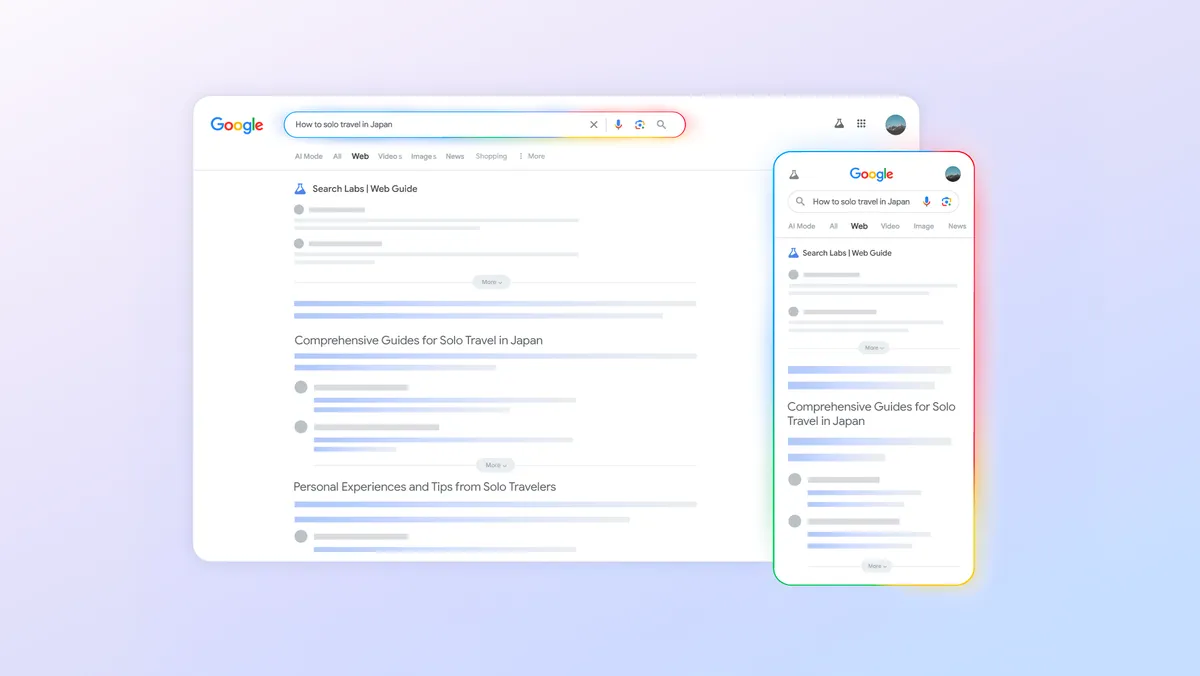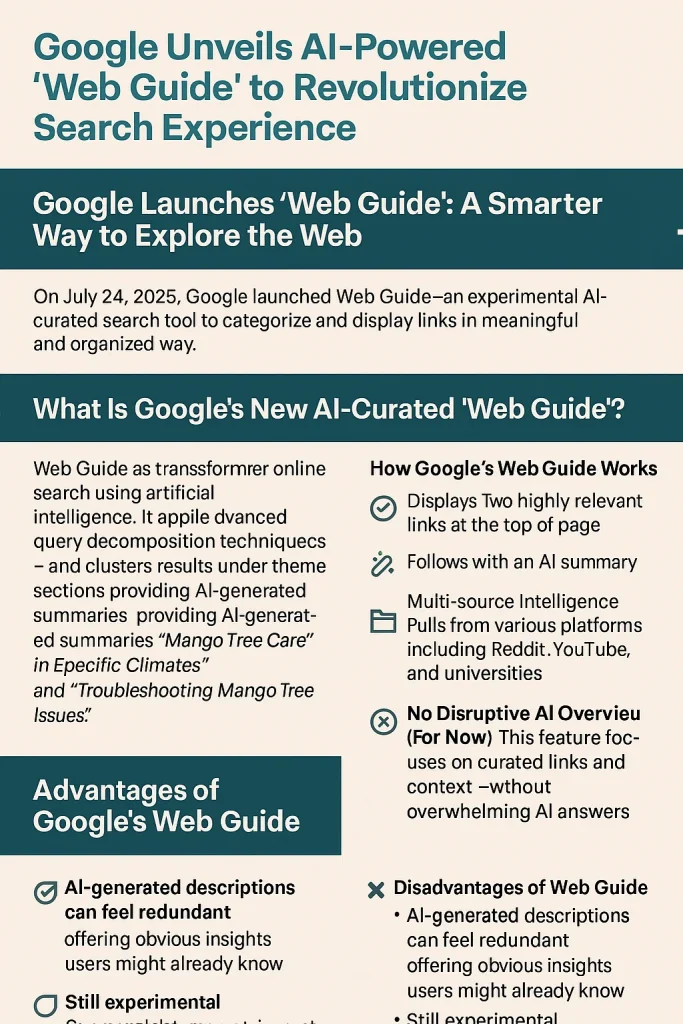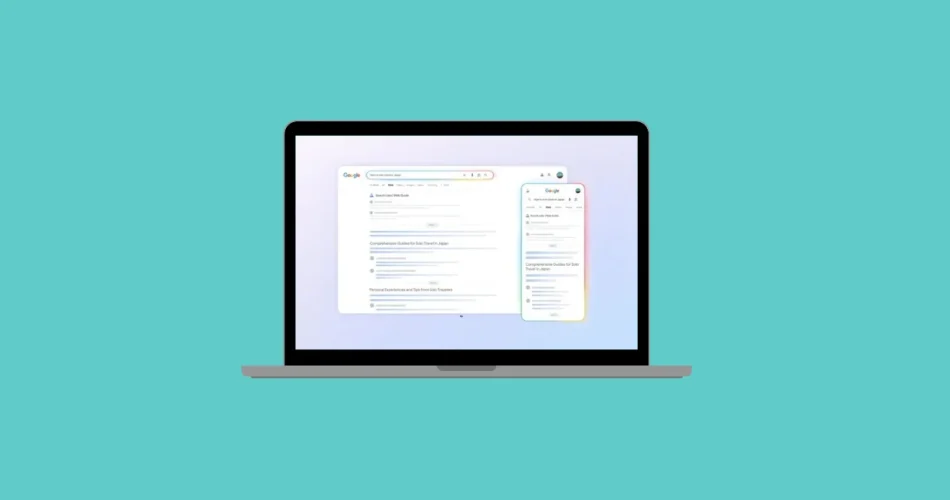On July 24, 2025, Google quietly rolled out a groundbreaking feature called Web Guide—an experimental AI-curated search tool aimed at enhancing how users interact with search results. Integrated into Google Search Labs, this feature leverages a customized version of Google’s Gemini AI model to categorize and display links in a more meaningful and organized way.
Unlike traditional search that offers a plain list of ten blue links, Web Guide groups related resources, summarizes key topics, and answers sub-questions using generative AI—all while keeping the user interface clean and link-first.

What Is Google’s New AI-Curated ‘Web Guide’?
Web Guide is Google’s latest attempt to transform online search using artificial intelligence. Instead of simply listing results, it applies advanced query decomposition techniques, breaking down a user’s request into multiple related searches. It then clusters the results under themed sections, providing AI-generated summaries to guide users toward the most relevant content.
This smart functionality currently appears under the “Web” tab of Google Search for those who enable the test via Search Labs. Importantly, it does not yet include AI Overviews, making it a more structured and less overwhelming experience than other AI integrations.
How Google’s Web Guide Works
When a user searches something like “how to care for a mango tree,” Web Guide does several things differently:
- Displays Two Highly Relevant Links at the top of the page
- Follows With an AI Summary
- Categorizes Remaining Links under themes such as:
- “Mango Tree Care in Specific Climates”
- “Troubleshooting Mango Tree Issues”
- “Comprehensive Mango Tree Care Guides”
These links pull from a wide variety of sources including universities, YouTube, Quora, and even Reddit—which Google now officially sources through a $60 million annual content licensing deal.
For instance, under the category “Comprehensive Mango Tree Care Guides,” you might see a prompt like:
“The most effective way to care for a mango tree varies slightly depending on its age, location, and specific cultivar…”
While some users may find these AI summaries helpful, others could consider them redundant compared to simply clicking the link.
Why Internet Users Are Trying Web Guide
Search fatigue is real. With the internet becoming a vast ocean of fragmented content, users increasingly crave organized, contextual, and direct answers.
Web Guide solves several common user pain points:
- Overwhelming search results
- Disjointed content scattered across pages
- Time wasted clicking multiple irrelevant links
Instead of forcing users to dig through unrelated results, Web Guide provides curated suggestions and categories, guiding them straight to trusted sources.
Real-World Example of AI in Action
You can even ask multi-part questions like:
“My family lives across multiple time zones. What tools can help us stay connected?”
Web Guide responds with tailored insights and resources—divided into tools for messaging, scheduling, and maintaining emotional closeness—proving that it understands complex queries and returns context-aware results.
Advantages of Google’s Web Guide
✅ Better Organization
Content is grouped under relevant subtopics, saving users from endless scrolling.
✅ Enhanced Relevance
The top results are often more accurate thanks to AI filtering.
✅ Multi-source Intelligence
Pulls from various platforms including Reddit, YouTube, and universities.
✅ No Disruptive AI Overview (For Now)
Unlike AI Overviews, this feature focuses on curated links and context, not overwhelming AI answers.
Disadvantages of Web Guide
❌ AI-Generated Descriptions Can Feel Redundant
Some of the summaries offer obvious insights users might already know.
❌ Still Experimental
Only available via opt-in through Search Labs and not yet in full production.
❌ Limited to the ‘Web’ Tab
While Google plans to expand it to the “All” tab, for now, it’s isolated from the broader search experience.
The Future of Google Search?
Google has stated that Web Guide is only the beginning. Though it’s currently confined to the “Web” tab, plans are underway to roll it out more broadly, possibly integrating it into all Google Search results over time.
It reflects a broader shift in the tech giant’s vision: moving away from traditional link-based search and toward a context-first, AI-driven browsing experience.
You can try out Web Guide today by enabling the feature in Google Search Labs—a test bed for the company’s most experimental innovations.

Conclusion:
Google’s Web Guide is a compelling new chapter in the evolution of online search. It strikes a balance between traditional search and AI-driven innovation by keeping links front and center while enhancing them with structure and relevance.
While not perfect, it offers a glimpse into a more organized internet—where AI helps users navigate, not dominate, the experience. As Google continues refining the tool, Web Guide might soon become the default way we all search the web.
And if you'd like to go a step further in supporting us, you can treat us to a virtual coffee ☕️. Thank you for your support ❤️!

We do not support or promote any form of piracy, copyright infringement, or illegal use of software, video content, or digital resources.
Any mention of third-party sites, tools, or platforms is purely for informational purposes. It is the responsibility of each reader to comply with the laws in their country, as well as the terms of use of the services mentioned.
We strongly encourage the use of legal, open-source, or official solutions in a responsible manner.



Comments